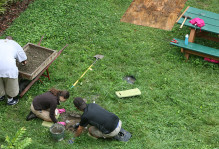Redux: Is it really that hard?
In a post dated July 29, 2008, I posed that question after reading about a non-profit organization that was reportedly bringing electrical power and other basic necessities to communities in Africa. I wondered out loud whether all of the effort to research, build partnerships, and develop collaborative community efforts is necessary for successful social change. The news article seemed to suggest that an alternative approach works just fine: figure out what you think is the problem; get a couple hundred thousand dollars; and get on about remaking a part of the world.
More than three years later, I remain as unconvinced by the alternative as I was when I wrote the blog post. We have yet to implement a project that provides clean or cleaner drinking water or one that improves nutrition, or any effort to reduce the impacts of flooding of toxic water. Just last week, and after some very anxious and somewhat contentious moments, we arrived at agreements that may provide some temporary relief from flooding in one small community in the Dominican Republic. It will be some time yet before that strategy (making available a row boat to allow safe passage across a road during seasonal floods) is fully in place—and some time longer before we are able to evaluate its effectiveness and its effects on local social structure and culture. We know these things:
- it reflects both careful assessment of alternative strategies and local wisdom
- it relies on and helps to build the community’s capabilities for working together
- it fosters infrastructure that will be foundational for subsequent efforts
- it is part of a larger, integrated, and more holistic effort to solve flooding and other problems that undermine health in the community
Redux answer: Yes.


No comments.
Comments are currently closed. Comments are closed on all posts older than one year, and for those in our archive.